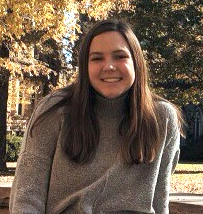Editor’s note: The following essay was the first-place winner in the local Edward Buncombe Chapter of the Daughters of the American Revolution Courageous Beginnings contest, part of the organization’s celebration of the 100th anniversary of the passage of the 19th Amendment. The contest was open to seniors in area high schools, who were asked to think about how this milestone accomplishment may have affected their own family history and what voting means to them today.
When women won the right to vote in 1920, my great-great-aunt Willie Bowman was 23 years old. The oldest child of very conservative parents, she battled to be independent despite seemingly unpermitting circumstances. Willie’s parents strongly opposed her becoming self-reliant, but she persevered. While she remained single and lived with her parents their whole lives, Willie succeeded in becoming self-supporting by getting a job as a secretary in the large and industrial city of Chattanooga, Tenn. As a woman who thought for herself and did not let her parents keep her from working, it is probable that Willie was the first woman in my family to vote in an election.
Being among the 21% of employed women at the time, Willie was most likely a supporter of the suffragist movement and very eager to vote in the 1920 election, but it certainly wasn’t easy for her to actually do so. The 19th Amendment gave women the legal right to vote, yet people in the United States were still widely divided over whether women truly deserved to vote. Willie’s parents did not allow her to marry, so it’s presumable that voting would have been out of the question. However, like many other young women in the 1920s, Willie realized that the only person who should make decisions about her life was herself. Contributing to the future of her country was far more important to Willie than the opinion of others, even her family.
[This] year will mark 100 years since the 19th Amendment was passed, and women’s suffrage has not lost its importance. Voting is what makes America a democracy, and since women make up more than half of the United States’ population, it is critical that women are able to engage in the responsibility of voting. Voting allows one to participate in government by choosing representatives. This process allows every citizen to have a voice in decisions that will determine the course of their lives and liberties. Without the democratic institution of voting, the United States would not be the country of opportunity that it is for many today.
Trends show that an increasing number of eligible voters are not actually voting. This is attributed, in part, to feelings of disenfranchisement; many feel that politicians are not listening to votes, and as a result, people do not feel voting is worth it. The American government system is far from perfect, but those who decline the opportunity to vote forget that it will never be fixed if citizens like themselves do not elect representatives who can make the necessary changes. Choosing not to vote is a choice that will never yield results, much less bring change to an imperfect government.
For instance, many state governments are attempting to overturn Roe v. Wade, which found abortion to be a constitutional right of women. A study conducted by the Pew Research Center found that 60% of women support this right. If those women were to use their right to vote and elect local and federal representatives who shared their opinion, women would ensure that abortion remains legal. As said by Desmond Tutu, a human rights activist from South Africa, “If you are neutral in situations of injustice, you have chosen the side of the oppressor.” Remaining neutral in elections and choosing not to exercise the liberty of voting results in abuses to the liberties of Americans and of people throughout the world.
Just as it was important to my great-great-aunt Willie to express her civil liberties through voting, it is important to me, 100 years later. While there are women around the world who do not have suffrage, I am lucky that many women who came before me fought tirelessly so that one day I could decide who represents me in government. My vote alone may not determine the course of history, but I know that my vote most definitely has an impact on the future of my life, my country and the world.
— Maggie Kinton
Class of 2020
Asheville High School






Good for you and let’s just all cross our fingers and hope that this young lady will vote for a candidate(s) who won’t completely disregard women’s rights and personal freedoms as does the current hot mess.